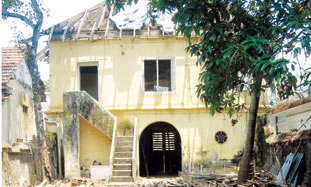Synagogue near Cochin being renovated
By MICHAEL FREUND IN COCHIN, INDIA
May 25,2010
India project aims to refurbish Jewish house.
 A
massive restoration project aimed at refurbishing one of the oldest and most
beautiful synagogues in southern India has gotten underway thanks to funding
and support provided by local and federal Indian authorities, The Jerusalem
Post has learned.
A
massive restoration project aimed at refurbishing one of the oldest and most
beautiful synagogues in southern India has gotten underway thanks to funding
and support provided by local and federal Indian authorities, The Jerusalem
Post has learned.
Work began last month on renovating the Parur synagogue, which is located in the village of North Paravur, approximately 18 km. north of Cochin, in the Indian state of Kerala.
The 400-year old structure is believed to have been built on the ruins of a previous synagogue dating back to the 12th century. After most of the local Indian Jewish community moved to Israel, the synagogue fell into disuse in the 1970s and the building began to deteriorate.
Last year, local officials decided to restore it as part of a larger heritage conservation and tourism development project.
“The restoration work of the Parur synagogue symbolizes the eagerness of Kerala’s people to celebrate their multi-religious heritage,” Dr. Venu V. Ias, the Kerala district government’s secretary of tourism, told the Post. “They cherish this composite culture, and since the Jews left Parur for Israel, the Kerala society wants the synagogue to be a site where they can have memories of this area’s Jewish connection”.
According to Ias, the project will take six months and will cost more than 85 million Indian rupees, or $1.8 million, to complete.
The funding is being provided by the Kerala state government along with what Ias described as “special assistance” from the Indian government in New Delhi.
Dr. Shalva Weil, a world-renowned specialist on Indian Jewry at the Hebrew University in Jerusalem, expressed satisfaction that the synagogue is being restored.
“This is a dream come true,” she told the Post. “For many years, I have visited the Parur synagogue. It was so beautiful and its preservation will encourage Israeli and Jewish tourism in the area.”
Weil is among those being consulted by the team leading the renovation efforts.
According to Jay Waronker, a professor of architecture at Southern Polytechnic
State University who has studied Indian synagogues, the Parur synagogue is
unique, representing “the most complete and elaborate example of a Jewish house
of prayer incorporating the many influences of building design from this region
of Kerala.”
“Its architecture,” Waronker noted, “was shaped by various Jewish building traditions. As a result, a distinct style of synagogue architecture can be experienced at Parur.”
This sentiment was echoed by Marian Scheuer Sofaer, an American activist involved in the Parur project.
“The synagogue’s exquisite design,” she says, “with its small-scale colonnaded walkways leading to the sanctuary, brings to mind some elements of the Second Temple depicted in the model at the Israel Museum.”
“It is an architectural treasure,” she added, “that will be popular with wandering Jews and travelers interested in architectural diversity.”
Along with other Jewish houses of worship in the region, the Parur synagogue served greater Cochin’s 3,000 Jews until most moved to Israel after the establishment of the Jewish state. Fewer than 35 Jews remain in the area.